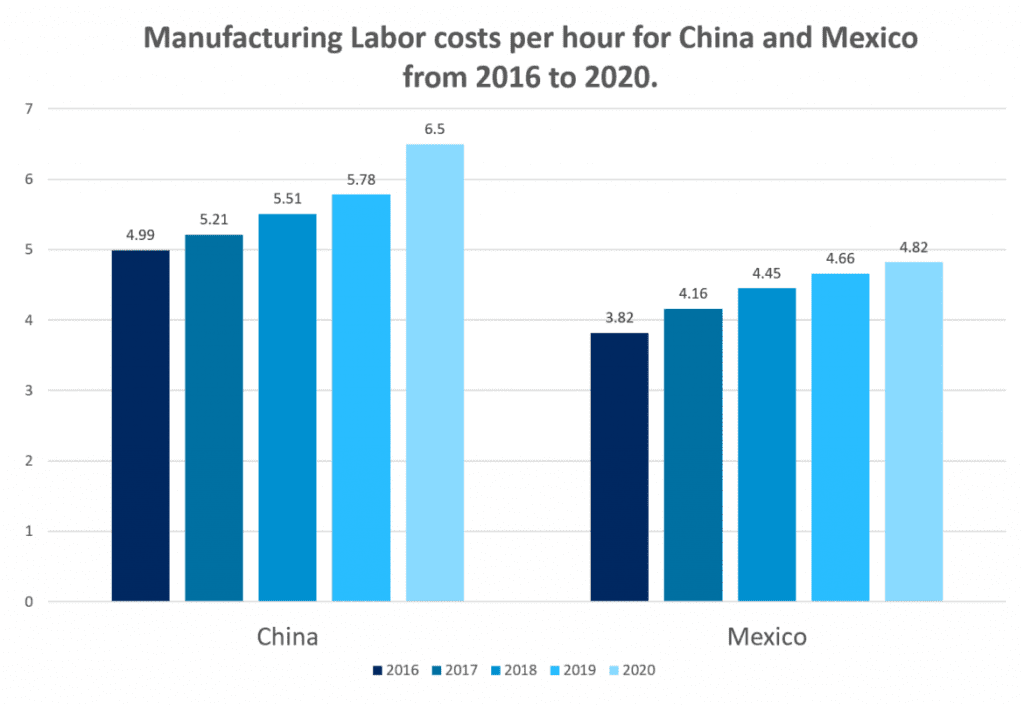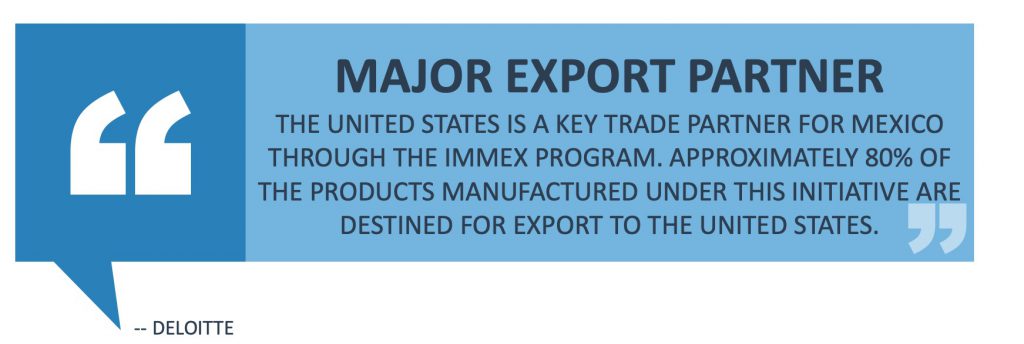Last Updated on June 16, 2025
Mexico's booming manufacturing sector has become a magnet for international companies seeking its advantages. As companies explore the possibilities south of the border, understanding the government's hand in shaping policies and providing incentives becomes crucial for success. In this article, we'll act as your guide, demystifying the intricate web of government support. We'll also help you understand government policies and incentives for manufacturing in Mexico.

Understanding Mexico's Manufacturing Landscape
Mexico's manufacturing landscape is dynamic and promising. With its strategic location, competitive advantages, and ongoing development, it is poised to remain a key player in global manufacturing for years to come.
- Proximity to the US: Mexico's geographical advantage allows for efficient transportation and trade with its northern neighbor, making it a prime location for nearshoring and supply chain integration.
- Cost-competitive labor: Mexico offers skilled labor at lower wages than many developed countries, attracting manufacturers seeking cost efficiency.
- Free trade agreements: Mexico's extensive network of free trade agreements, including USMCA, provides preferential access to major markets and reduces tariffs.
- Government incentives: Mexico offers various tax breaks and other incentives to attract foreign manufacturing investment.
- Developing infrastructure: Mexico constantly improves its infrastructure, with investments in ports, highways, and logistics facilities.

Government Policies: A Guiding Force
Manufacturing in Mexico is shaped by the government. From trade agreements to labor regulations, understanding the regulatory environment is essential for businesses to navigate successfully.
The Mexican government has actively pursued policies to promote foreign investment and facilitate manufacturing facilities. This includes streamlined permit processes and regulatory frameworks aimed at reducing bureaucratic hurdles.
The Mexican government is working to attract foreign investors to build factories in Mexico in order to boost the economy of Mexico.By taking this big move of bringing in foreign investment, the government in Mexico will be able to create jobs, employment opportunities and boost the economy and economic growth of the country. Also, along with employment opportunities it will bring new technologies and processes that can help to modernize manufacturing sector of Mexico.
Why did the Mexican government work to attract foreign investors to build factories in Mexico?
Incentives: Fueling Growth
In manufacturing, incentives can be a game-changer. Mexico offers a range of incentives to attract businesses, such as tax breaks, duty-free imports, and financial support for infrastructure development. These incentives not only make the country an attractive destination but also contribute to manufacturing growth and sustainability.
Mexico has just announced significant tax incentives for companies in certain key industries to relocate operations to Mexico. A government decree issued on October 11, 2023 seeks to boost the nearshoring trend targeting ten export-oriented manufacturing sectors.
US State Department: 2023 Investment Climate Statements: Mexico
Navigating the Regulatory Maze
While opportunities are abundant, the regulatory landscape can be complex. Understanding the intricacies of permits, environmental regulations, and labor laws is crucial for smooth operations. Many companies opt for expert guidance to ensure compliance and maximize Mexican government benefits.
The Role of Trade Agreements
Mexico's participation in trade agreements, such as the United States-Mexico-Canada Agreement (USMCA), opens up a vast market for manufacturers. This agreement fosters collaboration and trade between the three nations, providing businesses with a competitive edge and access to a broader consumer base.

The Best Government Policies and Incentives for Manufacturing in Mexico
Mexico offers a diverse range of government policies and incentives to attract foreign investment in its manufacturing sector. Here are some of the best options.
Tax benefits:
- Reduced corporate income tax: Certain industries, like aerospace and medical devices, may qualify for a 0% corporate income tax rate for 10 years.
- Accelerated depreciation: Companies can claim depreciation on capital equipment faster, reducing taxable income.
- VAT refunds: Companies can claim refunds on value-added tax (VAT) paid on imported machinery and equipment.
Customs Duty Exemptions:
- Temporary importation programs: Companies can import raw materials and machinery duty-free for a limited period for use in export goods production.
- Maquiladora program: The IMMEX program allows companies to import duty-free materials for assembly and export of finished products.
Other incentives:
- Grants for research and development: The Mexican government offers grants to companies investing in R&D activities related to manufacturing.
- Infrastructure development: The government invests in infrastructure projects like ports, highways, and industrial parks, improving accessibility and logistics for manufacturers.
- Training and education programs: The government provides vocational training and educational programs to develop the skilled workforce needed for manufacturing jobs.
Additional factors to consider:
- State-level incentives: Each Mexican state offers its own set of incentives, which vary depending on industry and location.
- Free trade agreements: Mexico's extensive network of free trade agreements can provide additional benefits to manufacturers, such as reduced tariffs and improved market access.
- Policy stability: While Mexico has a strong track record of attracting foreign investment, it's imperative to consider the potential for policy changes that could impact your business.
Conclusion: Seizing the Mexican Manufacturing Advantage
In conclusion, the Mexican government's hand in shaping policies and providing incentives creates a conducive environment for manufacturing success. Navigating this landscape requires a comprehensive understanding of regulations, a proactive approach to compliance, and strategic utilization of available incentives. In the end,it is important to do the research as understanding government policies and incentives for manufacturing in Mexico can be very beneficial for companies seeking to establish manufacturing.
FAQs:
Q1: What types of incentives does the Mexican government offer for manufacturers?
A1: The Mexican government provides incentives such as tax breaks, duty-free imports, and financial support for infrastructure development to attract and support manufacturing operations.
Q2: How does the USMCA benefit manufacturers in Mexico?
A2: The United States-Mexico-Canada Agreement (USMCA) fosters collaboration and trade, providing manufacturers in Mexico with a competitive edge and access to a broader consumer base.
Q3: What challenges do businesses face when manufacturing in Mexico?
A3: Challenges include language barriers, cultural differences, and regulatory complexities. Engaging local expertise and fostering open communication are key strategies for overcoming these challenges.
Q4: How can businesses navigate the regulatory maze in Mexico?
A4: Navigating the regulatory landscape requires a comprehensive understanding of permits, environmental regulations, and labor laws. Many companies opt for expert guidance to ensure compliance.
Q5: Why is Mexico considered an attractive destination for manufacturing?
A5: Mexico's strategic location, skilled labor force, and participation in trade agreements make it an attractive destination for manufacturing. The government's supportive policies and incentives further contribute to its appeal.
Explore More: Discover Related Blog Posts
Expand your knowledge and delve deeper into more information found in our Manufacturing in Mexico Guide with our curated collection of related blog posts.
- Why Mexico Isn’t a Perfect Manufacturing Solution (and What That Really Means)
- Mexico Rewards Manufacturing Companies That Commit: Here’s Why
- Stop Waiting: Mexico Product Manufacturing Is Ready When You Are
- Mexico’s Customs Clearance: Why It’s Faster—and Smarter—for Manufacturers
- Setup Process for Manufacturing in Mexico: What You Should Know About Timelines, Permits, and Common Pitfalls
About NovaLink
As a manufacturer in Mexico, NovaLink employs a unique approach that transcends the traditional model of shelter production. More than just the location of your manufacturing, we would like to become a partner in your manufacturing in Mexico. You will be able to relocate or initiate manufacturing for your company in Mexico in a low-cost labor environment with very little delay or up-front costs. Find out how we can help you by handling the manufacturing process.
There are NovaLink facilities in the border cities of Brownsville, Texas, Matamoros, Mexico, and Saltillo, Mexico.